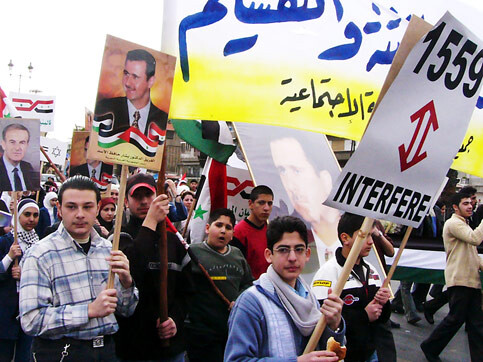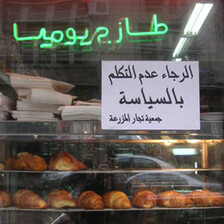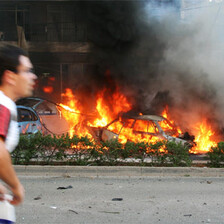Electronic Lebanon 28 March 2008

Syrians protest against UN Resolution 1559 that demands Damascus withdraw its army from Lebanon, a move Damascus called “foreign interference.” Analysts fear instability in the region. (Hugh Macleod/IRIN)
BEIRUT, 28 March 2008 (IRIN) - A boycott by Lebanon and major Arab powers of the Arab summit in Damascus (29-30 March) has dashed hopes for a last-ditch settlement of the Lebanese presidential crisis, raising fears of a descent into violence after it passes.
Political turmoil in Lebanon has often been the precursor to regional conflict and serious humanitarian problems in the past.
Beirut’s four-month-old presidential vacuum shifted to centre stage in recent weeks as the Lebanese government and its Saudi Arabian backers accused Syria of blocking the vote, and announced a boycott of the Damascus summit in response.
Egypt has followed suit and, like Riyadh, is sending a junior official to the meeting that is supposed to gather together the heads-of-state of the 22 Arab League nations. King Abdullah of Jordan has yet to announce his attendance.
Hopes that the summit would be a catalyst for a solution to the political deadlock in Lebanon between the Western-backed governing coalition and the Iranian and Syrian-backed opposition led by Hizballah died on 25 March with the 17th postponement of the parliamentary session to elect a president.
The opposition resigned from cabinet in November 2006, three months after Hizballah claimed a “divine victory” in its July War against Israel, accusing the ruling coalition of ignoring their demands.
Ahmad Moussalli, a political science professor at the American University of Beirut, said the fractured summit marked the death of an Arab League initiative aimed at electing a president, redistributing cabinet seats and paving the way for parliamentary elections next year.
“The Arab Summit was supposed to revive the initiative and give it some energy, but now what we will be seeing is the stagnation of the Lebanese situation and this could deteriorate into further negative interaction between the two groups in Lebanon,” he said.
“I think we’ll be seeing demonstrations, union action that takes on a political shape and riots and clashes,” Moussalli said. The presidential vote is now set for 22 April, but few analysts expect a breakthrough by then.
The two sides have agreed on army commander Michel Suleiman as a consensus presidential candidate, but are battling over power-sharing in the next government. The opposition accuses the ruling majority of working to US and Israeli interests, while some in the majority accuse Hizballah of being a tool of Iranian policy.
Fears of war
Fears of war are never far beneath the surface in Lebanon, which was torn apart in a civil war between 1975-1990 and has endured assassinations of anti-Syrian figures, military personnel and deadly street protests since the assassination three years ago of former Prime Minister Rafiq al-Hariri. Hariri’s murder led to the withdrawal in April 2005 of Syrian troops and intelligence officers from Lebanon after nearly three decades.
A UN inquiry initially found evidence of the involvement of Syrian security officials in Hariri’s killing - a charge vehemently denied by Damascus - and an international tribunal to try suspects is in the final stages of preparation at The Hague. Syria has said it will refuse to send suspects to the tribunal, which it says is a political tool against it.
“The tribunal could push Syria either way, to be more extreme or militant, or to push for a deal,” said Paul Salem, head of the Carnegie Endowment’s Middle East centre in Beirut.
“My expectation is that the presidential election will drag on until next year’s parliamentary election, and that will require national agreement on a new election law. I think we are looking at at least another year of crisis.”
Oussama Safa, head of the Lebanese Centre for Policy Studies, said he expected “controlled escalation” on the streets in Lebanon at least until the USA elects its next president in November and determines the direction of US policy on Iran, Iraq, Lebanon and the Israeli-Palestinian conflict.
“In Lebanon, I would expect reminders here and there and the two sides exchanging messages once the summit is out of the way,” he said. “That is, assassinations or roaming bouts of violence.”
“Somewhere it’s going to explode”
Lurking behind the Arab isolation of Syria are US-Iran tensions, the analysts said, with Syria paying the price for being the only major Arab player allied to Teheran, which Washington accuses of sponsoring terrorism and attempting to acquire nuclear weapons. Iran says its nuclear program is for peaceful purposes.
“I think this could be the beginning of the death of the Arab League. Now we will see more the crystallization of alliances with the two major players in the region, the United States and Iran,” said Moussalli.
Moussalli said the regional rift so graphically illustrated by the split over the Arab summit could blow up in Iraq, the Palestinian territories or Lebanon.
“Somewhere it’s going to explode — Lebanon seems a very likely place — and push the players either to go to war or reach a settlement. As things seem now, there is likely to be no settlement.”
This item comes to you via IRIN, a UN humanitarian news and information service, but may not necessarily reflect the views of the United Nations or its agencies. All IRIN material may be reposted or reprinted free-of-charge; refer to the copyright page for conditions of use. IRIN is a project of the UN Office for the Coordination of Humanitarian Affairs.
Related Links


